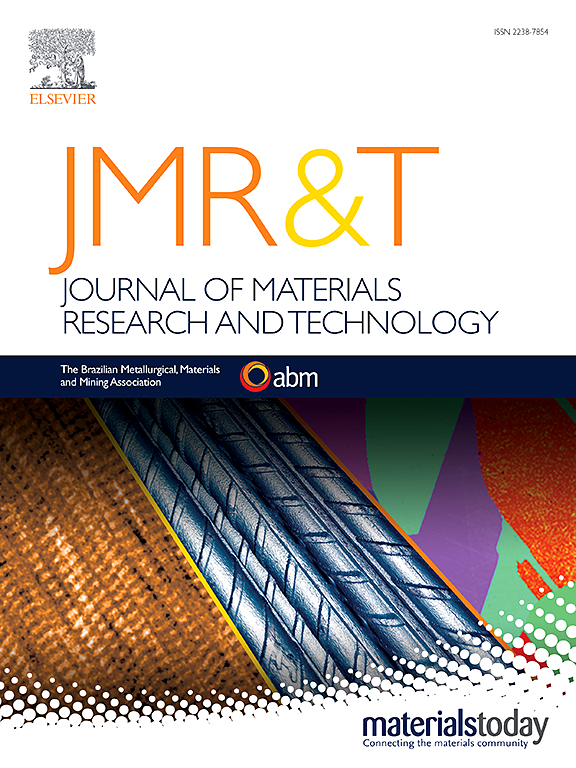Influence of strength difference between soft and hard zones on hetero-deformation induced strengthening effect: Taking heterostructured β Ti alloy as an example
IF 6.2
2区 材料科学
Q1 MATERIALS SCIENCE, MULTIDISCIPLINARY
Journal of Materials Research and Technology-Jmr&t
Pub Date : 2024-09-13
DOI:10.1016/j.jmrt.2024.09.022
引用次数: 0
Abstract
The large strength difference between soft and hard zones in heterostructured materials is a double-edged sword: on the one hand, the effective back () and forward stress () are generated to produce hetero-deformation induced (HDI) strengthening and strain hardening effect. On the other hand, the micro-cracks tend to initiate and propagate along the interface to cause premature failure. Here we prepared three different heterostructured Ti-4.8Al-5.6Mo–3V-1.5Cr-1.6Fe alloys to reveal the influence of magnitude of strength difference between soft primary α phase (αp) and hard β matrix on its tensile strength and ductility. It demonstrates that only when the sum of applied stress () and is greater than the yield strength of hard β matrix (), i.e., , the alloy can obtain both high strength and ductility. Contrary, when , the alloy exhibits a highest strength but a lowest ductility. These findings are expected to help with designing heterostructured materials for superior mechanical properties.
软区和硬区强度差对异质变形诱导强化效应的影响:以异质结构 β Ti 合金为例
在异质结构材料中,软区和硬区之间的巨大强度差异是一把双刃剑:一方面,有效背应力(τb)和前应力(τf)会产生异质变形诱导(HDI)强化和应变硬化效应。另一方面,微裂纹往往会沿着界面引发和扩展,从而导致过早失效。在此,我们制备了三种不同的异质结构 Ti-4.8Al-5.6Mo-3V-1.5Cr-1.6Fe 合金,以揭示软初级 α 相(αp)和硬 β 基体之间的强度差大小对其抗拉强度和延展性的影响。研究表明,只有当外加应力(τa)和τf之和大于硬质β基体的屈服强度(σyhard),即τa+τf>σyhard时,合金才能获得高强度和延展性。相反,当τa+τf<σyhard 时,合金的强度最高,但延展性最低。这些发现有望帮助设计具有优异机械性能的异质结构材料。
本文章由计算机程序翻译,如有差异,请以英文原文为准。
求助全文
约1分钟内获得全文
求助全文
来源期刊

Journal of Materials Research and Technology-Jmr&t
Materials Science-Metals and Alloys
CiteScore
8.80
自引率
9.40%
发文量
1877
审稿时长
35 days
期刊介绍:
The Journal of Materials Research and Technology is a publication of ABM - Brazilian Metallurgical, Materials and Mining Association - and publishes four issues per year also with a free version online (www.jmrt.com.br). The journal provides an international medium for the publication of theoretical and experimental studies related to Metallurgy, Materials and Minerals research and technology. Appropriate submissions to the Journal of Materials Research and Technology should include scientific and/or engineering factors which affect processes and products in the Metallurgy, Materials and Mining areas.
 求助内容:
求助内容: 应助结果提醒方式:
应助结果提醒方式:


